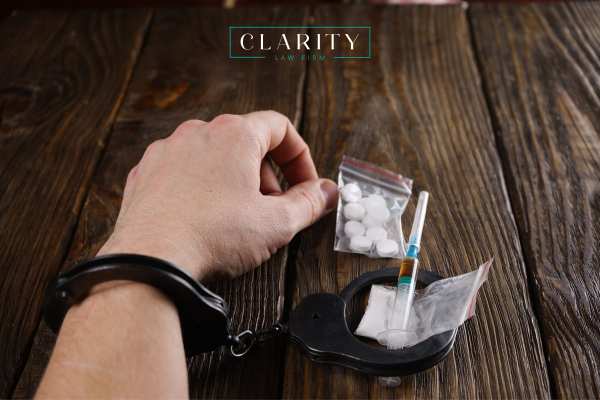Understanding Michigan’s drug possession laws is crucial for anyone facing charges or seeking to learn more about potential legal consequences. Whether you're dealing with a small amount of marijuana or a more serious substance, the penalties in Michigan can vary depending on the type and quantity of the drug involved. Michigan has strict regulations regarding controlled substances, and being convicted of drug possession can result in serious repercussions, such as fines, imprisonment, and a permanent criminal record. It’s important to understand the state's legal framework to avoid costly mistakes and to better navigate any potential legal challenges.
If you're facing drug possession charges in Michigan, it's crucial to seek experienced legal counsel. A knowledgeable criminal defense attorney in Dearborn can help you understand your rights, explore possible defenses, and work toward the best possible outcome. Call Clarity Law at (313) 513-1919 today for a consultation to discuss your case and learn how we can assist you in navigating Michigan’s drug laws.
Drug Schedules in Michigan
Michigan classifies controlled substances into five schedules based on their potential for abuse, accepted medical use, and the likelihood of dependency. These schedules follow federal guidelines and play a significant role in determining penalties for drug-related offenses.
- Schedule I: Drugs in this category have a high potential for abuse and no accepted medical use. Examples include heroin, LSD, and ecstasy. Possession or distribution of these substances often results in severe criminal penalties.
- Schedule II: Substances with a high potential for abuse but with some accepted medical uses under strict regulations fall under Schedule II. These include cocaine, methamphetamine, oxycodone, and fentanyl. Abuse of these drugs can lead to severe psychological or physical dependence.
- Schedule III: Schedule III drugs have a lower potential for abuse compared to Schedules I and II. They have accepted medical uses but may still lead to moderate or low physical dependence or high psychological dependence. Examples include anabolic steroids, ketamine, and certain medications containing codeine.
- Schedule IV: These substances have a low potential for abuse and are commonly used in medical treatments. Drugs such as Xanax, Valium, and Ambien are in this category. While less addictive, misuse can still result in legal consequences.
- Schedule V: Drugs with the lowest potential for abuse and a wide range of accepted medical uses are classified as Schedule V. These often include medications with small amounts of narcotics, such as cough syrups containing codeine.

The classification of a drug directly impacts the penalties for possession, manufacture, or distribution. Higher schedules, like I and II, carry more severe consequences, while lower schedules may involve lighter penalties or alternative sentencing options.
If facing drug-related charges in Michigan, understanding how a controlled substance is classified can help shape an effective legal defense. Working with a drug possession lawyer is essential for navigating these complex laws.
Penalties for Drug Possession
Michigan enforces strict penalties for drug possession offenses. The severity of the penalties depends on factors such as the type of drug, the quantity, and prior criminal history. Controlled substances are classified into schedules, with harsher consequences for substances listed in Schedule I and II.
Possession of Schedule I or II Substances
Drugs like heroin and cocaine fall under these categories. Possessing these substances is a felony offense. Penalties may include:
- Up to four years in prison.
- Fines of up to $25,000.
For larger amounts, the consequences are significantly more severe, potentially resulting in decades of imprisonment and higher fines.
Marijuana Possession
While Michigan has legalized marijuana for personal use within specific limits, exceeding these limits or possessing it with intent to distribute can lead to criminal charges. These may include misdemeanor or felony penalties based on the circumstances.
Prescription Drug Offenses
Possessing prescription drugs without a valid prescription is illegal. Depending on the type and quantity of the drug, charges range from misdemeanors to felonies, with penalties including jail time and fines.
Factors That Can Affect Drug Possession Penalties
When facing drug possession charges in Michigan, several factors can influence the severity of penalties. Courts consider these factors to determine appropriate consequences, ranging from fines to incarceration.
- Prior Convictions: Individuals with previous drug-related convictions are likely to face enhanced penalties. Repeat offenders often receive harsher sentences, such as longer incarceration periods or higher fines, due to their prior criminal history.
- Amount of Drug in Possession: The quantity of the controlled substance plays a significant role in determining penalties. Possessing larger amounts may lead to more severe charges, such as felony possession, and suggest possible trafficking or distribution intent.
- Intent to Distribute: If authorities find evidence of intent to distribute—such as large quantities of drugs, packaging materials, scales, or significant cash—penalties will likely escalate. Intent to distribute is treated more seriously than possession for personal use.
- Location of Arrest: Being caught with illegal drugs in designated protected areas, like near schools, parks, or daycare facilities, can lead to enhanced penalties. These zones are intended to safeguard vulnerable populations, and offenses in these areas carry stricter consequences.
Understanding these factors highlights the importance of mounting a strong defense to minimize potential penalties. Consulting an experienced attorney is essential for navigating Michigan’s drug possession laws.
Drug Diversion Programs
Michigan offers diversion programs designed to help individuals charged with possession of drugs avoid traditional criminal penalties. These programs focus on rehabilitation rather than punishment, providing an opportunity to address substance abuse issues while potentially avoiding a criminal record.
Drug diversion programs are alternatives to prosecution or incarceration for eligible individuals. Participants must meet specific requirements, such as attending treatment programs, complying with court-ordered conditions, and remaining substance-free.

Eligibility depends on factors like the nature of the offense, criminal history, and willingness to participate in treatment. First-time offenders or those charged with nonviolent drug possession are typically the primary candidates.
Types of Diversion Programs
Diversion programs offer alternatives to traditional criminal penalties, helping eligible individuals avoid jail time by completing specific requirements. These programs often focus on rehabilitation and addressing the root causes of criminal behavior.
- Michigan's 7411 Program: Named after Section 7411 of the Michigan Public Health Code, this program allows first-time drug possession offenders to avoid a conviction if they successfully complete probation. Participants must follow all court-ordered conditions, including treatment, drug testing, and community service.
- Drug Treatment Courts: These specialized courts handle cases involving substance abuse, offering structured programs that include treatment, regular drug testing, counseling, and judicial supervision. Successful completion may result in reduced charges or dismissal of the case.
- Deferred Sentencing Programs: Defendants may enter a plea but have sentencing deferred while they complete treatment or probation. Successful participants can have their case dismissed, preventing a criminal record.
Benefits of Drug Diversion Programs
Drug diversion programs offer an alternative to traditional sentencing by emphasizing treatment and rehabilitation over jail time. They can help participants avoid a criminal conviction while addressing the root causes of substance abuse.
- Avoiding a Criminal Record: Successful participants often have charges dismissed or reduced.
- Focus on Rehabilitation: Programs emphasize addressing underlying substance abuse issues through therapy and support.
- Reduced Penalties: Participants may avoid jail time and significant fines.
- Long-Term Support: Many programs provide access to resources that help individuals maintain sobriety and stability.
Participants must meet all program requirements, which often include:
- Regular drug testing.
- Attendance at counseling or treatment sessions.
- Adherence to probation terms.
- Avoiding new criminal activity.
Failure to comply can result in reinstatement of criminal charges and traditional penalties.
Michigan’s diversion programs represent a valuable opportunity for individuals to overcome substance abuse issues and move forward without the burden of a criminal record. Consulting with a drug crime attorney can help determine eligibility and guide individuals through the legal process.
Build a Strong Defense Against Drug Possession Charges
Understanding Michigan’s drug possession laws is essential to protecting your rights and navigating the legal system effectively. Whether you are facing charges or simply seeking more information, the consequences can be serious, making it crucial to take proactive steps in addressing your situation.
If you or someone you know is dealing with drug possession charges in Michigan, don't hesitate to reach out to us for guidance. Our experienced drug crime attorneys in Dearborn are here to help you understand your options and work toward the best possible outcome for your case. Contact Clarity Law today for a consultation to discuss your legal needs.